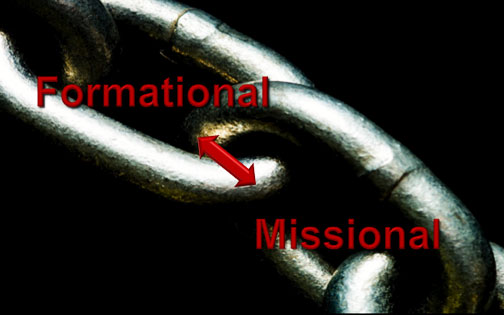« Missional and Formational in John 17 and 20 | Home | P.S. Isn’t This Missional and Formational Stuff Just a Bunch of Lingo? »
Missional and Formational: Interim Summary
By Mark D. Roberts | Thursday, July 9, 2009
Part 11 of series: Missional and Formational?
Permalink for this post / Permalink for this series
So far, I’ve looked at the biblical connections between the missional and formational dimensions of the Christian life. After some initial definitions, I’ve examined these connections in the Old Testament, the life of Jesus, and the ministry of Jesus. I had thought I might go on and look at several New Testament passages that show how missional and formational go together in early Christianity. But I think it’s time to end this series, at least for now. So I’ll move on to an interim summary. (If you’re curious about the some the New Testament passages I would have considered, you might want to study the following on your own: Acts 1:1-8; 4:23-31; 2 Corinthians 5:13-21; Philippians 3:7-16; Ephesians 6:10-20; 2 Timothy 1:6-7; Philippians 2:1-13; 1 Corinthians 15:9-10.)
The basic finding of this series has been the essential character and essential interconnectedness of the missional and formational dimensions of the Christian life.
Both missional and formational are essential dimensions of the Christian life. All Christians and all churches have a missional calling. We have been sent by Jesus into the world to continue his mission. All Christians and all churches have a formational calling. We are to be formed into Christlikeness both as individual believers and as churches. Neither missional nor formational are optional for Christians.
Missional and formational are essentially connected in the Christian life. You can’t have one without the other if your missional and formational realities are fully Christian. We will only be able to do the mission of Christ, individually and together, if we are formed in the image of Christ. Or, to use the language of Jesus, we will only bear much fruit if we abide in him. Moreover, if we abide in him, we will in fact bear much fruit. The more we become like Jesus and the more we are shaped by and filled with his Spirit, the more we will be invested in his mission. So missional and formational are like two links in a chain that must not be separated. They need each other.

Of course I am aware that many Christians and many churches major in being missional or formational, but not both. Some churches are big on outreach: evangelism, justice, caring for the poor, etc. Some churches are big on formation: prayer, worship, silent retreats, Bible studies, etc. But all churches, no matter their size, should be big on both. Missional without formational becomes programmatic, turning believers into cogs in a missional wheel rather than disciples who are living missionally in the world. Formational without missional turns people inward, making partial, self-absorbed disciples who don’t fulfill the basic calling of the disciple of Jesus: to make more disciples.
Scripture makes it clear that individual Christians are to be formed in the image of Christ so that we might engage in his mission. Scripture also makes it clear that in order to engage in his mission, we need to be formed in the image of Christ.
Central to both missional and formational are:
1. The Holy Spirit, who empowers us for mission, shapes us to be like Jesus, and binds us together as Christian community. Without the Spirit of god you won’t have mission or formation.
2. The Word of God in Scripture, which gives us our missional message and mandate, teaches us God’s truth, and forms our hearts to be like Jesus.
3. The community of disciples, who are necessary to our formation in Christ and to our engagement in his mission. We cannot be either fully missional or fully formational on our own.
4. Relationships with God and God’s people. Spiritual formation isn’t a process that happens to us so much as the result of a relationship with the triune God. Mission isn’t something we do to people so much as a relationship with them through which they encounter the living God.
This last point suggests are direction for my next blog series. I’m going to explore further the relational dimension of the Christian life. Stay tuned . . . .
Topics: Missional and Formational |
Comments
Thanks for your willingness to make a comment. Note: I do not moderate comments before they are posted, though they are automatically screened for profanities, spam, etc., and sometimes the screening program holds comments for moderation even though they're not offensive. I encourage open dialogue and serious disagreement, and am always willing to learn from my mistakes. I will not delete comments unless they are extraordinarily rude or irrelevant to the topic at hand. You do need to login in order to make a comment, because this cuts down on spam. You are free to use a nickname if you wish. Finally, I will eventually read all comments, but I don't have the time to respond to them on a consistent basis because I've got a few other demands on my time, like my "day job," my family, sleep, etc.
You must be logged in to post a comment.














